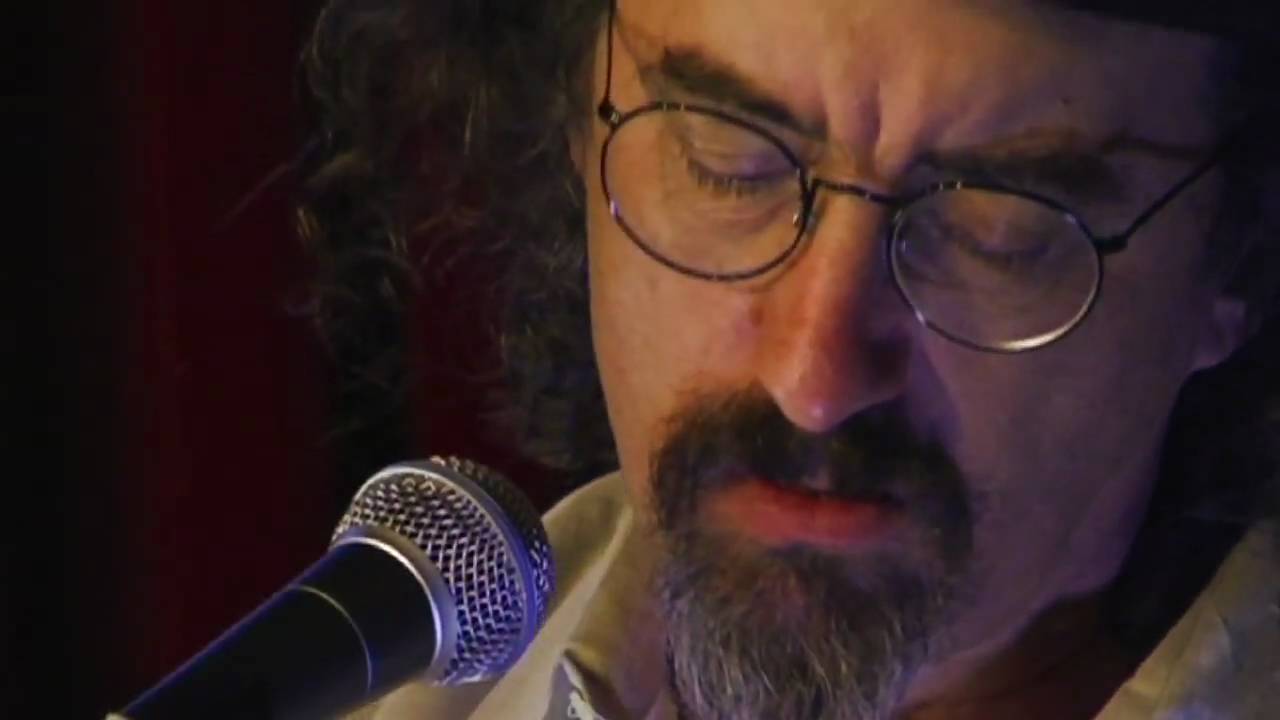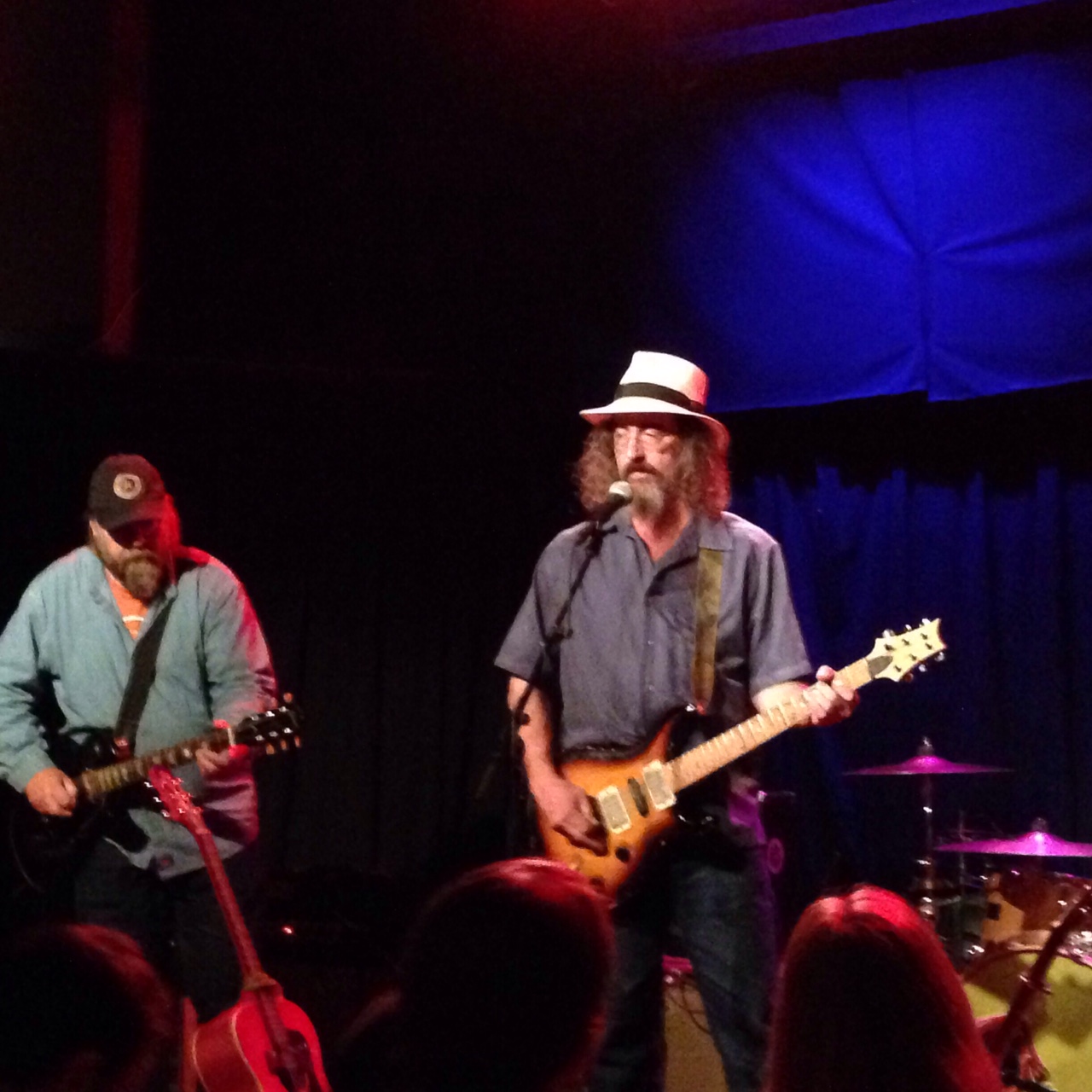James McMurtry’s “Game” Reveals More of Himself, and of a Vividly Evoked America

James McMurtry’s first CD of new material since 2007, “Complicated Game” reveals much more of the man inside the great songwriter than just his dusty boots.
James McMurtry is back and attention must be paid. He should be playing larger venues than he does, as a great American songwriter, as good as we have South of Bob Dylan. He’s also an ace guitarist who can play solos as concisely and tellingly textured as his brilliantly compressed short-story songs.
And like Dylan, his voice is only serviceable, by conventional standards. It conveys a droll incisiveness, and yet can surprise with its expressiveness. But he works from the realm of understatement rather than the over-singing that “sells” a lot of music — even for some good performers — a tendency the “American Idol” syndrome of pop culture has facilitated.
I think McMurtry’s grainy voice comfortably wears his vivid and real American writing like a tough, shabby jacket, collar turned up against the wind.
He’s arguably America’s greatest living songwriter who’s more storyteller than poet. On Complicated Game he looks inward more than usual, right from the album opener, “Copper Canteen,” a strained relationship song that feels like the echoing chill of countless American marriages. The wife tries to improve a church-avoiding deer hunter-ice fishman who has recurring dark nights of the soul:
When I wake up at night/ in the grip of a fright/ and you hold me so tight to your chest/ and your breath on my skin/ still pulls me back/ until I’m weightless and then I can rest. It’s a great evocation of the alone-together syndrome, and the existential compression of a lifetime suddenly rushing way to fast into the rearview mirror. 1
He’s a solo rendition of “Copper Canteen,” with McMurtry on 12-string guitar:https://www.youtube.com/watch?v=IM_BjzDCDXs
Then there’s the romantic refrains, as in “You Got to Me” and “She Loves Me,” about a man who shares his woman with a parking lot attendant, but holds onto the conviction that she loves him despite the “complicated game” that life on the road makes of love. It’s a story of brave-to-the-point-of-foolish amour, of hope against against the odds. Between the lines, love is dribbling between his fingers onto his boots, like a woman’s heart seemingly turned to sand. Sequenced as the fourth song — after “You Got Me” and the stiff-upper-lip bounce of “I Ain’t Got a Place in This World” — this would seem to be the same woman who held him to her chest, in the grip of the midnight fright, and made him believe in love.
The game is signified right in the stark, black-and-white album cover photograph: Two electrical cords extending from McMurtry’s feet intersect, like two human pathways, just as they disappear into the border’s white void, as if swallowed up by the inscrutably horrifying “whiteness of the whale” which Melville famously meditated on. So electricity, which fuels his artistic power of communication onstage, may have betrayed him, because the symbolic intersection of human hearts is now out of his reach, and control. Though “it was part of our agreement” he never saw the other dude coming. You hear the vulnerability in the self-defensive shell of his voice. It sounds autobiographical.  James McMurtry. Courtesy youtube.com
James McMurtry. Courtesy youtube.com
So we see more into McMurtry — as a human being, as a man — through his extraordinary powers as a songwriter. That quality makes this recording special, a more deeply radiating beacon in his increasingly impressive recording catalog, and authentic at several levels. Perhaps he’s short-changed in love, but McMurtry’s strongest calling is inevitably to that long, winding road, a gravitational force, which a woman must accept or reject.
He unflinchingly gazes across the blighted American horizon. With superb literary skill, he fashions composites of people he’s known or met who breathe and haul heavy hearts. With largely unadorned, perfectly-pitched accompaniment, “South Dakota” speaks intimately of raising cows: “It was barely even fall/ but that blizzard got them all/Left them sprawled across the pasture stiff as boards.”
The song is inhabited by a returning veteran who reflects: “There ain’t much between the Pole and South Dakota/ and barbed wire won’t stop the wind/You won’t get nothing here but broke and older. I might as well re-up again.” The song is dedicated to the songwriter’s family and father, the renowned novelist Larry McMurtry, and anyone “who has ever had responsibility for the health and welfare of a cow.”
Larry’s son typically offers a dead-insect windshield view — yet it retains the land and the people’s indomitable spirit. “Carlisle’s Haul” frames such harsh magnificence in terms of a crab-fishing job: “It’s hard not to cry and cuss/when this old world is bigger than us/and all we got is pride and trust in our kind.” McMurtry’s observational story-telling powers have been rightly compared to his father’s, which produced The Last Picture Show, Lonesome Dove and the screenplay to Brokeback Mountain, among other indelible works.
But the younger McMurtry also recalls Charles Dickens in the way his gritty details and array of eccentric characters serve a broader critique of society and industrialization. His 2005 protest anthem “We Can’t Make It Here” still defines our economic times as well as anything.
By now you get the feeling this is a great artist’s most mature statement to date, and also a recording that ought to resonate across the nation’s political spectrum for its invocations of American freedom, and of its discontents. Both seem to flow through his veins by now. But McMurtry’s holding steady.
“Deaver’s Cross” is a righteous bluegrass song and the first of two remarkably magnanimous pieces for a guy stereotyped as a grumpy pessimist: So when you’re fishing that March brown hatch/Won’t you share your morning’s catch/with those whose ground you walk across/May their memory be not lost.
A song that follows, after a few of the tough-minded ones, reminds us that, though unmistakeably a bleach-boned Texas troubadour, McMurtry has clearly traversed America, gigging and searching for dusty companionship. And hell if he can’t celebrate, even as he stares down reality, in the lovely, Uilleann-piping ode to “Long Island Sound.” Riding a gentle, rolling melodic wave evoking that long, lapping coast, he sings, “These are the best days, these are the best days, boys put your money away, I got the round./ Here’s to all you strangers, the Mets and the Rangers, long may we thrive on the Long Island Sound.”
It’s the understated peak of the record and it catches the setting sun on a horizon of rooftops, because McMurtry has climbed this high to see what a magnificent place the great old island is. And then, the two closing lines are poetic strokes; he turns and spies New Mexico and Carolina — by way of Austin — from that metaphoric peak. He might be looking at Anywhere, U.S.A.
 Liner photo from James McMurtry’s “Complicated Game.” Photo by Shane McCauley
Liner photo from James McMurtry’s “Complicated Game.” Photo by Shane McCauley
And yet, McMurtry remains too much of a cold-eyed critic of easy social conventions to leave us with only comforting thoughts. The album closes with its strangest song “Cutter,” about a sorry soul who physically mutilates himself with a knife, for reasons ostensibly sociological and psychological, yet ambiguous: “I miss my dog from years ago/Where he went, I still don’t know./whiskey and coffee while I burn my toast, and build a cage for all my ghosts.” Could be one of countless desperate military veterans, or other American survivors. McMurtry’s under-appreciated vocal vibrato nails the man’s unsteady, just-hanging-on societal mask.
Nevertheless, as he told recently told Rolling Stone, he sees his characters as “enduring, not fading away. Standing against the current that wants to wash you away but can’t, yet.” 2
Despite his prodigious gifts as a wordsmith, McMurtry has a justified reputation for being tight-lipped with journalists, and he turned me down once when I asked for a brief interview, after a show in Milwaukee. James McMurtry live at The High Noon Saloon in Madison with guitarist Tim Holt. Photo by Marc Eisen.
James McMurtry live at The High Noon Saloon in Madison with guitarist Tim Holt. Photo by Marc Eisen.
However, after his recent show at the High Noon Saloon in Madison, with no journalistic intentions, I meandered up to his merchandise table, before he got to it. Then suddenly I heard James talking to me, chatting about how he had to jettison his former band name, The Heartless Bastards, “because a more popular band had taken the name.” I’d been eyeing the LP version of Live in Aught-Three, with the formerly named Bastards.
The moment almost felt like his story about the woman who’d never leave him because “she loves me” and he was there first, with his bastards. In the next few moments his nominal loss took on a full human embodiment.
He still works with the same trusty band mates he had in “aught three” — guitarist-accordionist Tim Holt, bassist-harmony vocalist Ronnie Johnson, and drummer Darren Hess. But for his 2007 Just Us Kids record and 2008’s Live in Europe tour and CD/DVD, the great British rock ‘n’ roll keyboardist Ian McLagan had joined the band, and McLagan subsequently moved to Austin, McMurtry’s home base. I’d previously seen McMurtry solo, so I’d hoped to hear McLagan. I asked James if he still played with Ian. “Oh, well, he died,” he said. And then he quickly turned away from me, as if fleeing into the protective shell of the crusty artful observer.
Had he stayed to chat a bit longer I’d probably have told him that two hours before I drove to Madison from Milwaukee — with tickets to his show pre-purchased — my sister Betty called me. Our sister Maureen had died that morning, of a heart attack, at age 60. In a daze of shock, I drove to Madison, because I know Maureen — a music lover and especially a lover of the film musical of Dickens’ Oliver! — would’ve wanted me to. She would’ve appreciated McMurtry’s flinty yet humane tale-spinning. Had I planned a formal concert review, or had not Maureen suddenly died, I might’ve had wits enough to find out that Ian McLagan died in December, in Austin, Texas. 3
Though this moment of revelation seemed painful for McMurtry, he gathered himself gracefully. His fleeting openness with this fan disarmed the journalist in me. I purchased one of the small, inexpensive poster paintings of McMurtry his assistant was hawking. He signed it, while situating himself right at the exit of the saloon, autographing an array of CDs and LPs from fans filing out. Rather than letting them come to the table, he’d come right to his loyal listeners, those who hear and feel his songs.
For some things in this tough road hombre’s life, it is not a complicated game, and he seems grateful for that.
________
1 The opening stanza of Copper Canteen — McMurtry’s knowing description of a man cleaning his hunting gun and hoping for a bit more opportunity to “kill one more doe” — goes against my “Bambi-loving” grain. (The song was reportedly inspired by a McMurtry trip to Wisconsin and to The Steel Bridge Song Fest, in Sturgeon Bay, a wonderful annual event billed as “the world’s only collaborative songwriting festival,” This year’s festival is June 11-14: http://www.steelbridgesongfest.org/) But I accept the song as an honest characterization of life in rural Wisconsin. Turns out, McMurtry’s a gun owner and gun lover, as he relates in his blog. As I would’ve expected, McMurtry is an extremely thoughtful, reasonable and responsible gun owner.
He addresses the sea change of public opinion prompted by the Newtown massacre. He’s one of many gun owers who disagree with the extreme scare tactics of The National Rifle Association, which he says he quit when Charlton Heston was president, saying he was “just sick of the rhetoric.” McMurtry also has a take on the broader culture wars of guns, which he sees as being perpetrated mainly for profit by the gun industry. Then he makes this observation:
“Of course, the gun industry is not the only industry contributing to our cultural divisions. Entertainment is all over it. And we seem to be mimicking the entertainment industry, evolving into a nation of stereotypes, one big reality show with a country/hip-hop soundtrack, scripted and sculpted to resemble some Hollywood dream of every white man’s America, where rednecks are proud of the moniker, though their cotton-farming great grandparents are spinning in their graves at the very notion, because they worked like hell to elevate their descendents from the mere suggestion of the term ‘redneck.'” http://www.jamesmcmurtry.com/blog.html
2. http://www.jamesmcmurtry.com/
3. Keyboardist Ian McLagen was a member of the original British-invasion band The Small Faces with Rod Stewart. He went on to a stellar solo and session-sideman career, performing with The Rolling Stones, Bob Dylan, Bonnie Raitt, Chuck Berry, Bruce Springsteen, Green Day and countless big names who play large theaters, or auditoriums or arenas. Which begs the question: Why doesn’t James McMurtry have a larger following?
This review was originally published in Culture Currents (Vernaculars Speak) http://kevernacular.com/?p=6085 and in shorter form in The Shepherd Express: http://shepherdexpress.com/article-25797-james-mcmurtry-complicated-game-%2528complicated-game%2529.html




